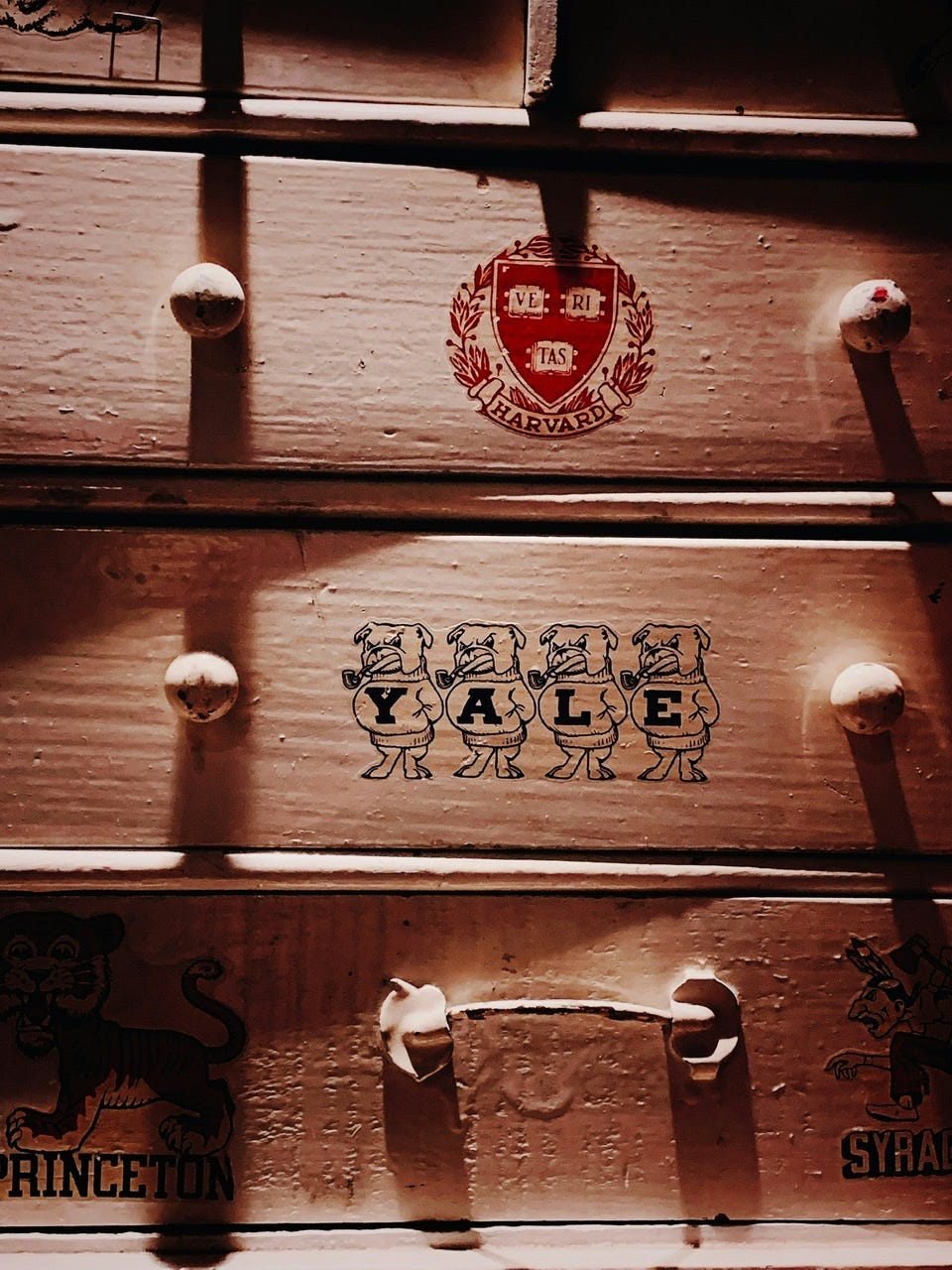On Gilmore Girls & Dismantling My Ivy League Fantasies
- Liz

- Aug 5, 2025
- 8 min read
Updated: Oct 27, 2025

It’s a cold night in Washington Heights when a friend of a friend says, “That sounds shitty” upon learning of my alma mater: Southeast Missouri State University.
I’m speechless.
“She’s got a job, though!” My friend responds immediately, mounting my defense before I have a chance to do so myself.
It had never occurred to me to be embarrassed of earning my bachelor’s degree from a state university until 2015, when I was living and working in New York City. Growing up where and how I did — the rural Ozarks, blue collar as hell — I had always felt quite grateful to have attended college at all. I still do. My dad didn’t get to, and his parents didn’t either. My mom is college-educated, but her mother wasn’t.
I’m also quite proud I graduated with honors while juggling work and life and classes. I’m relieved my student debt was a fraction of what it likely would have been had I attended a more prestigious university. I’ve lived through some highly publicized scandals that have rightfully damaged the reputation of the Ivy League, and I’m happy not to count Clarence Thomas, J.D. Vance, Brett Kavanaugh, or Ted Cruz among my fellow alumni.
Yet, beginning in my late twenties and ending only recently, I found myself fantasizing about completing a writing fellowship or a graduate program at the type of fancy, old, New England university I could only ever afford if I wasn’t required to pay for it: Harvard or Yale.
In my fantasies, I was always a fellow or a TA — a scholarship student — not an old money trust fund kid or a newly monied hillbilly. (Although, I must say: nice work if you can get it.) Even this scenario was fantastical thinking for me, because one can only responsibly attend a fully funded writing program if they’re debt-free and financially stable enough to forfeit a year or two of income.
I’m privileged in many ways, but I’ve never been wealthy. I’ve been working since I was 14. I’ve skipped meals to pay for medicine. While uninsured in my late twenties, I nearly died because I postponed going to the emergency room for much longer than I should have. I was a human budget cut in 2019, and I lost another job at the beginning of the Covid-19 pandemic. For years, I’ve been working part-time tutoring English and freelance writing whenever I can.
I only recently managed to secure another full time job with health insurance and retirement benefits. Thanks largely to Medicaid, I seem to have finally subdued the chronic pain I’ve been living with since the age of 12, and I’m currently able to work my full-time job and my part-time job while still managing to occasionally freelance. I’m crossing my fingers I’ll get to sustain this routine for at least a couple of years.
While I’m thankful for everything I have and every opportunity I’ve been given, I’ve long been angry about the state of wealth inequality in the United States and around the globe.
Although I don’t believe in vilifying those who were born into substantial generational wealth — they didn’t choose it — I’ve also never hit it off with rich people. I don’t know if I’ve ever bitten my tongue harder than I did on a press trip to Ibiza in 2017, when a Los Angeles-based influencer assured me: “It’s actually pretty cheap to travel Europe if you do it right.” I can only imagine the kind of out of touch comments I’d be exposed to at an Ivy League school.
For all of these reasons and more, I’ve been trying to determine where my Ivy League fantasies came from. I certainly didn’t grow up with them. Applying to an Ivy was never even an option in my young mind. Applying to any four-year university as an incoming college freshman wasn’t an option. I was always going to spend two years studying at my local community college — paying my way with scholarships and grants — and then two more years at a state university in Missouri or Arkansas.
It’s possible that simply being a writer who loves autumn is at least partly to blame. Fantasizing about a year or two of fully financed creativity in the place where fall falls the hardest makes sense when you’re the kind of writer who decorates for autumn on August first.
I’m sure insecurity plays a role as well. No matter how many times I prove myself to myself, I often feel underestimated by the people around me. Maybe a part of me felt like an Ivy League writing fellowship would be the thing that finally kept men from asking me — an English major, a published author, a professional English tutor, a library worker, and a volunteer judge for the Scholastic Art and Writing Awards — questions like: “Do you know who Leo Tolstoy is?”
Maybe a part of me thought an Ivy League stamp of approval would somehow be the thing that secured me lasting financial stability. Maybe it’s all of these things; but more than anything, I think my late blooming love of Gilmore Girls is the culprit.
I say “late blooming” because I didn’t watch the show until long after its finale aired. Thankfully, I didn’t grow up with cable TV; otherwise, I expect I would have become a Gilmore Girls fan before I’d already graduated from my “shitty” state college. As much as the series brings me comfort and joy, there are aspects of it I love to hate; and while I’m clearly not immune to the show’s blatant Ivy League worship, it’s one of the aspects I love to hate the most.
There’s a scene in season two when, in an ultimately successful attempt to convince Rory to run as her Vice President, Paris disparages Connecticut State. She suggests to Rory that participating in student government could be the one thing that secures her acceptance to Harvard, and if she refuses to do so: “Enjoy Connecticut State, sucker!”
In the show’s third season, Lorelei throws her napkin down mid-Thanksgiving dinner and storms outside because she believes her parents have manipulated Rory into applying to Yale despite knowing that Lorelei wants Rory to attend Harvard. It’s an incredibly dramatic response to what I can’t help but perceive as the biggest non-problem ever.
There’s a scene in season five when Lorelei retrieves Rory from jail; while she’s waiting for Rory to be released, she gushes to the police officer on duty: “On the whole, the kid is an angel. She goes to Yale.” I audibly gag every time I watch it.
In season six, Lorelei makes fun of community college even though she herself graduates with an associate degree in business from a community college in season two. Perhaps most upsetting, a major plot point of the show is when Lorelei stops talking to Rory for several months because she takes a break from Yale — the mother and daughter only reconcile after Rory has re-enrolled.
I was working as a features writer for a popular website at the time of the aforementioned “shitty” comment. The other members of my writing team included a Harvard graduate and an Oxford graduate, and my editor was a graduate of NYU. It was the kind of website that performed beautifully in the 2010s and has since conducted mass layoffs, and its resemblance to the website Rory interviews for in Gilmore Girls: A Year in the Life is comically uncanny — the open office plan, the quirky vibes, the young millennials typing away on their MacBooks.
A Year in the Life premiered on Netflix in autumn 2016, and like the original series, it’s very much a product of its time — I can practically smell avocado toast and hear “Hey Ho” when Rory stumbles through her interview with Sandy, the Editor in Chief of the website “Sandy Says.”
I’m never sympathetic when Rory doesn’t get the job she assumed she wouldn’t have to interview for and clearly doesn’t want — but I can relate to wanting more from a job than a steady paycheck, even when taking the steady paycheck might be the responsible thing to do.
In fact, Rory’s character arc of poor choices and general messiness in A Year in the Life is precisely why I enjoy the show’s revival much more than a majority of Gilmore Girls super fans seem to. If the original series worshiped the Ivy League, the revival does a great job of showing how even the most prestigious education and generous trust fund doesn’t necessarily guarantee job security or a life of consistent financial stability, much less a tendency toward wisdom. If the original series figuratively deified Rory, A Year in the Life humanizes her.
Rory, like her real life counterparts, is undeniably more advantaged than those of us who got our GED at 17 before attending a community college and then a state university. She’s more advantaged than the Ivy Leaguers who don’t come from wealth. But she also proves that — Yale-educated and trust-funded or not — capitalism is designed to chew workers up and spit us out, even the hyper-privileged ones. She personifies millennial burnout in a way that’s completely relatable, even if her level of socioeconomic privilege isn’t.
Just as I suspect Gilmore Girls is the driving force behind my past Ivy League fantasies, I can thank Leeja Miller’s YouTube channel for helping me to dismantle them.
I’ve known about the Ivy League’s classism and nepotism for as long as I’ve known about the Ivy League, but I only recently became aware of the institutions’ participation in slavery.
As a Missourian with roots in Tennessee, Kentucky, and Arkansas, I often consider my region’s participation in slavery, as well as its persisting legacy of racism and white supremacy. It’s impossible not to — my mom remembers segregation; my college town displayed a Confederate monument in its square until 2020. But I often forget that slavery wasn’t abolished throughout the North until the 1800s, which means the Ivy League absolutely benefited from the labor of enslaved people. Both Harvard and Yale embraced eugenics for a time as well.
Sexism rarely surprises me anymore — I’m a woman in my mid-thirties — but I didn’t fully understand just how sexist the Ivy League was until a while back. The founding of the Seven Sisters — seven traditionally all-female, elite liberal arts colleges that were created in the late 1800s — was the direct result of Ivy League sexism. Harvard has a long and messy history of discrimination against women, and Yale forbade the enrollment of women until 1969, as did Princeton. Dartmouth didn’t accept women students until 1972, and Columbia didn’t allow women until 1983.
As I write this, I’m 34, and the thought of relocating to the Northeast — even for a prestigious writing fellowship — exhausts me. Presently, I’m dreaming of becoming debt free and building an emergency fund. I like living close to my family. I enjoy the beauty and simplicity of rural southeast Missouri. I’ve moved across the country a few times in my adult life, and I have no desire to take on a cross-country move again.
Perhaps I’ll see the Ivy-covered walls of Harvard and Yale someday, but I doubt I’ll do so as a student or a fellow. More likely, I’ll visit the schools on my way to Connecticut’s Gilmore Girls Getaway.


